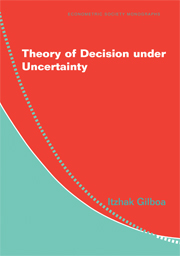II - Behavioral Definitions
Published online by Cambridge University Press: 05 January 2013
Summary
Let us take stock. We considered four probability assignment problems and three definitions of probability. The first, the principle of indifference, was so flawed that we struggled to find justifications for it even in the few examples in which it seems to make sense to a certain degree. The second, the frequentist approach, seemed fine for certain problems, but unable to cope with questions such as the occurrence of war or a stock market crash, or even the success of medical procedures. Unfortunately, some of the more important problems in our personal and professional lives are of the tricky types – those that cannot be assumed to be repeated in the same way, and maybe even not in a causally independent fashion. Lastly, we considered the subjective approach, which appears to be a powerful conceptual tool, dealing in the same way with coins as with wars.
But what exactly is this subjective probability? How do we determine it? Are there more or less rational ways to assign such probabilities? And are we sure that the probability apparatus is the right one to capture our intuition?
All of these questions call for an axiomatic approach. Such an approach can simultaneously explain to us what subjective probabilities mean exactly, how we can calibrate and measure them, why (and when) we should use them, and so forth.
- Type
- Chapter
- Information
- Theory of Decision under Uncertainty , pp. 49 - 50Publisher: Cambridge University PressPrint publication year: 2009



